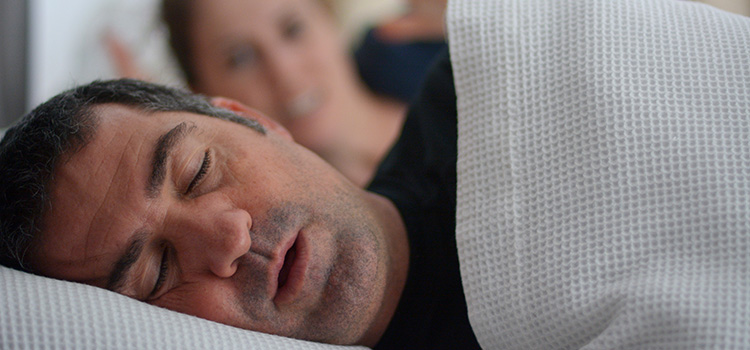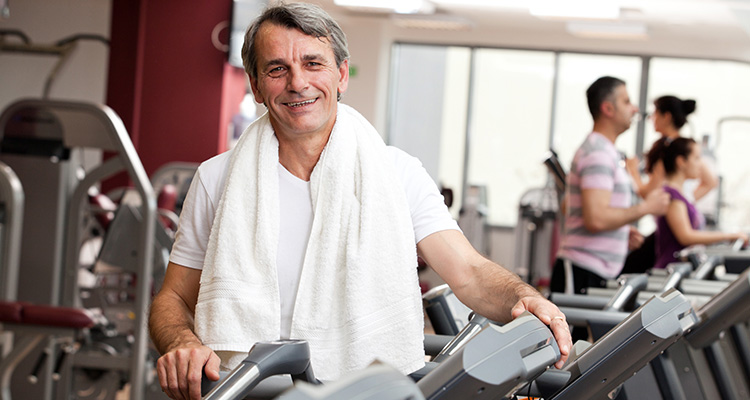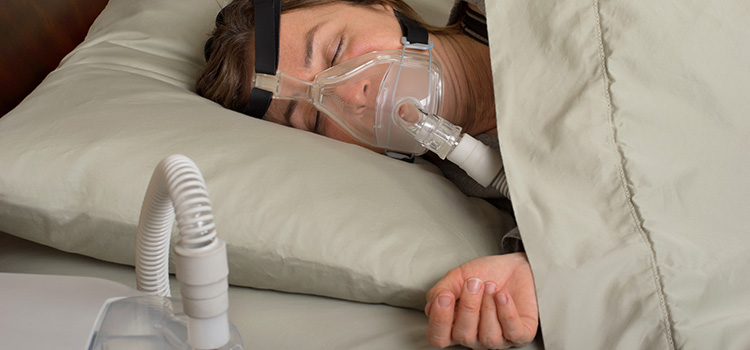Can a Mouth Guard Help With Sleep Apnea?
25th Apr 2020

If you’ve suffered from sleep apnea, you may wonder if there’s a sleep apnea treatment option that doesn’t take effort to implement. The answer is yes. Read on to see if a mouth guard for sleep apnea may ease your sleep apnea symptoms.
First, let’s take a moment to discuss sleep apnea. Snoring is often treated as a punchline, but as a symptom of obstructive sleep apnea (OSA), snores are no laughing matter. People with sleep apnea stop breathing for short periods of time during their slumber. Snoring, snorting, or gasping is the result of their body's efforts to restart the breathing process. Oxygen deprivation isn't healthy, so choosing an effective treatment for your sleep apnea is vital.

Mild, Moderate, or Severe?
Different levels of severity warrant different treatments. So, let’s discuss the Apnea-Hypopnea (AH) index. This is a measurement system used by doctors that tracks the number of times that you stop breathing during an hour of sleep. Johns Hopkins Medicine explains the way this breaks down:
Mild obstructive sleep apnea is diagnosed when your AHI is between 5 and 15, which means that you experience five to 15 apnea events in an hour.
Moderate obstructive sleep apnea is the diagnosis if your AHI is between 15 and 30.
Severe obstructive sleep apnea is defined by an AHI of more than 30.
Oral Devices and Mouth Guards for Sleep Apnea
With more than 100 oral appliances approved by the U.S. Food and Drug Administration for the treatment of sleep apnea, it's obvious that there's a market for these dental devices. How can a mouth guard combat sleep apnea? It's simple. The oral appliance positions your body in a way that protects your airway while you sleep.
Those with mild to moderate symptoms may be interested as well as those who haven’t had positive experiences with continuous positive airway pressure treatment (CPAP) therapy and other treatment methods and those who wish to use a night guard in conjunction with other treatments
Oral devices generally use one of two strategies to protect the upper airway:
Mandibular advancement devices
These are the most common type of FDA-approved sleep apnea night guards. MAD devices resemble the mouth guards worn by athletes or bruxism sufferers, but they're designed to gently push the lower jaw forward. This positioning brings the tongue forward, creating more space behind the soft palate and keeping the airway open.
In fact, a 2019 study used Multislice Computed Tomography and 3D imaging to prove that MAD devices widened the airways of patients with mild or moderate sleep apnea, halving the number of apnea episodes they experienced.
Tongue-retaining devices
These anti-snoring mouth guards work by holding the tongue so that it cannot fall back to block the airway. These devices are small enough to travel with and tend to be easy to use.
Sleep apnea mouth guards are a popular pick because they're convenient, easy to use, and comfortable. However, for best results, they should be custom-fitted and checked periodically by your doctor or dentist. If you're asked to complete another sleep study while wearing your night guard, keep in mind this will allow your health care providers to verify that the device is working for you.

Lifestyle Strategies to treat Sleep Apnea
A mouth guard may be all you need in order to find relief from sleep apnea. However, let’s review other treatment options. You should review these with a medical professional who understands your symptoms.
Let’s begin with lifestyle strategies. For some mild and moderate sufferers, certain lifestyle strategies may offer some relief. However, some may take time to implement and show results.
Maintain a healthy weight
Being overweight increases the odds of an airway collapsing.
Exercise
Regular exercise reduces stress, helps you maintain a healthy weight and improves the quality and duration of sleep.
Stop smoking
Smoking is tied to inflammation in the airways, which makes sleep apnea worse.
Shift your sleep position
A 2006 study revealed that sleep position is a factor in nearly 50% of obstructive sleep apnea cases. Sleeping on your back often makes things worse while sleeping on your side can reduce apnea events.
Avoid alcohol in the evening
Alcohol relaxes the muscles in the throat and upper airway, making you more vulnerable to tissue collapse.
Treat your allergies
Allergies lead to inflammation in the throat and sinuses, and that inflammation makes sleep apnea worse.
Use a humidifier
Dry air irritates the respiratory system. Using a humidifier can ease congestion and inflammation and reduce sleep apnea symptoms.
Treatment of Sleep Apnea with Surgery
When something structural is contributing to your obstructive sleep apnea, upper airway surgery may offer a solution. In this procedure, a surgeon removes the tonsils, adenoids, or other tissue from the rear of the throat to widen the upper airway.
In other cases, the jaw is surgically repositioned to widen the airway by creating more space behind the tongue and soft palate. Radiofrequency ablation is another option that can be used to shrink problematic tissue at the back of the throat.
While surgery can be effective for patients whose sleep apnea is the result of an anatomical issue, it comes with the risks associated with any surgical procedure. It is rarely recommended as the first line of treatment.

CPAP Therapy for Sleep Apnea
Continuous positive airway pressure therapy is widely recognized as the treatment of choice for obstructive sleep apnea. For CPAP therapy, you'll wear a mask to bed that is attached by tubing to a CPAP machine that supplies pressurized air. The higher air pressure keeps your airways open, preventing episodes of apnea.
Unfortunately, one side effect is the air pressure also dries out your mouth and nasal tissues and can cause discomfort in the chest and abdomen. Many users also find the mask uncomfortable or confining. Others are troubled by the noise of the CPAP machine or the hassles involved in using it. Although CPAP therapy is highly effective under ideal conditions, it's plagued by compliance issues.
Which Treatment to Try?
When working with your doctor to decide which treatment or combination of treatments you should try, you'll need to consider the effectiveness of the treatments, the specifics of your case, and your personal preferences. For example, adopting lifestyle strategies can be helpful for any type of sleep apnea, but sleep apnea patients who commit to these strategies often need to combine them with other treatments to manage their sleep apnea. On the other hand, surgery is highly effective for a select group of sufferers, but it is invasive, risky, and not suitable for many patients.
Deciding whether to opt for CPAP therapy or a mouth guard is something of a balancing act. In a 2007 review, researchers found that CPAP therapy reduced AHI by 75%, making it the best choice for people with severe sleep apnea. In comparison, the use of an oral appliance dropped AHI by 42%.
However, patients preferred the mouth guard. Using a CPAP machine is a hassle, so many patients skipped nights or stopped treatment completely. In contrast, up to 68% of patients were still using their night guards 30 months later. That increased compliance is likely a reason why the American Academy of Sleep Medicine recommends oral appliances as a first-line therapy for people with mild or moderate sleep apnea and as an alternative treatment for people with severe sleep apnea who couldn’t use CPAP therapy successfully.
The Mechanics of Obstructive Sleep Apnea
Snoring occurs when air is forced through a blocked upper airway. In people with obstructive sleep apnea, the muscles around the tongue and throat relax too much. This clogs the respiratory passages and prevents oxygen from reaching the lungs.
Sleep apnea is a sleep disorder that can make getting a good night's sleep impossible, and that lack of sleep can lead to daytime sleepiness, drowsiness and difficulties with focus, thinking, and memory. It also raises your risk of being injured in an accident.
Untreated obstructive sleep apnea doesn't just interfere with sleep. It's also linked with an increased risk for serious health concerns like hypertension, stroke, cardiovascular issues, depression, diabetes, and obesity. Additionally, there's a connection between sleep apnea and bruxism, a painful disorder that involves uncontrolled teeth grinding and jaw clenching. If left untreated, bruxism can damage teeth and trigger temporomandibular joint syndrome, commonly known as TMJ syndrome.
Related Articles:
Diagnosing Sleep Apnea
Snoring can be a red flag for obstructive sleep apnea. Other common warning signs include abrupt awakenings and starting the day with a dry mouth, sore throat, or headache. Sleepiness, poor energy, irritability, and difficulty concentrating can also be sleep apnea symptoms. Your doctor may suspect that you have obstructive sleep apnea after discussing your symptoms and your sleep history. The diagnosis is confirmed with a sleep study.
Get Your Sleep Back
Obstructive sleep apnea can have serious health implications, so getting a diagnosis from a sleep medicine specialist is essential. Fortunately, effective treatments are available, including mouth guards for sleep apnea.
Related Articles:

- Most Popular
- Hard Outside, Soft Inside
- 2MM Thick
- Moderate / Heavy

- Most Durable
- Hard Materials
- 1.5MM Thick
- Heavy / Severe

- For Day Time Use
- Thin, Barely Visible
- 1MM Thick
- Light / Moderate

- For Clenching
- Flexible & Soft
- 1.5MM Thick
- Light / Moderate

